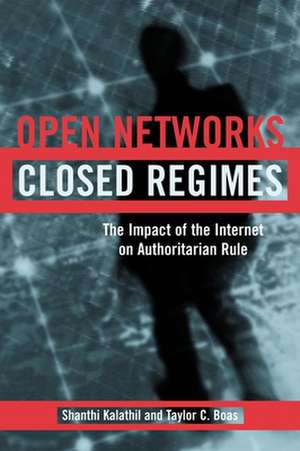Open Networks, Closed Regimes: The Impact of the Internet on Authoritarian Rule
Autor Shanthi Kalathil, Taylor C. Boasen Limba Engleză Paperback – 26 dec 2002
As the Internet diffuses across the globe, many have come to believe that the technology poses an insurmountable threat to authoritarian rule. Grounded in the Internet's early libertarian culture and predicated on anecdotes pulled from diverse political climates, this conventional wisdom has informed the views of policymakers, business leaders, and media pundits alike. Yet few studies have sought to systematically analyze the exact ways in which Internet use may lay the basis for political change. In O pen Networks, Closed Regimes, the authors take a comprehensive look at how a broad range of societal and political actors in eight authoritarian and semi-authoritarian countries employ the Internet. Based on methodical assessment of evidence from these cases—China, Cuba, Singapore, Vietnam, Burma, the United Arab Emirates, Saudi Arabia, and Egypt—the study contends that the Internet is not necessarily a threat to authoritarian regimes.
Preț: 104.76 lei
Nou
Puncte Express: 157
Preț estimativ în valută:
20.05€ • 20.97$ • 16.65£
20.05€ • 20.97$ • 16.65£
Carte disponibilă
Livrare economică 12-26 martie
Preluare comenzi: 021 569.72.76
Specificații
ISBN-13: 9780870031946
ISBN-10: 0870031945
Pagini: 218
Dimensiuni: 152 x 229 x 13 mm
Greutate: 0.33 kg
Ediția:New.
Editura: Brookings Institution Press
Colecția Carnegie Endowment for Int'l Peace
Locul publicării:United States
ISBN-10: 0870031945
Pagini: 218
Dimensiuni: 152 x 229 x 13 mm
Greutate: 0.33 kg
Ediția:New.
Editura: Brookings Institution Press
Colecția Carnegie Endowment for Int'l Peace
Locul publicării:United States
Notă biografică
Shanthi Kalathil is associate in the Information Revolution and World Politics Project at the Carnegie Endowment. A former Hong Kong-based journalist, she has written extensively on Asian politics in the information age. Taylor C. Boas is
Descriere
As the Internet diffuses across the globe, many have come to believe that the technology poses an insurmountable threat to authoritarian rule. Grounded in the Internet's early libertarian culture and predicated on anecdotes pulled from diverse political climates, this conventional wisdom has informed the views of policymakers, business leaders, and media pundits alike. Yet few studies have sought to systematically analyze the exact ways in which Internet use may lay the basis for political change. In O pen Networks, Closed Regimes, the authors take a comprehensive look at how a broad range of societal and political actors in eight authoritarian and semi-authoritarian countries employ the Internet. Based on methodical assessment of evidence from these cases—China, Cuba, Singapore, Vietnam, Burma, the United Arab Emirates, Saudi Arabia, and Egypt—the study contends that the Internet is not necessarily a threat to authoritarian regimes.











